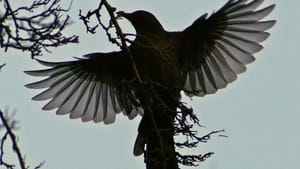Stay in the Loop
BSR publishes on a weekly schedule, with an email newsletter every Wednesday and Thursday morning. There’s no paywall, and subscribing is always free.
Gunfire and birdsong
Orchestra 2001: Four Views of Nature and Religion

Richard Wernick’s 1971 Kaddish-Requiem is subtitled “Secular Service for the Victims of Indochina.” The reference to the specific concerns of the 1970s does it a disservice. It’s a powerful piece that can be heard as a memorial for all the individuals who have been trapped in modern wars, whatever your opinion of the rights or wrongs of any particular war.
As the title indicates, Kaddish-Requiem combines the funeral texts of the two religious traditions that lie at the heart of Western civilization. The center section is a recorded collage of several versions of the Hebrew kaddish. The third section opens with a mezzo-soprano singing the Latin requiem aeternam (grant them eternal rest), beginning offstage and continuing as she enters and takes her place beside the conductor. The opening movement is a purely instrumental expression of anger, with shrieks from the flute and piccolo, and a harsh, jagged violin cadenza.
The Kaddish-Requiem opened an Orchestra 2001 program that placed an unusual emphasis on the performers. The main attraction at Orchestra 2001 concerts is the opportunity to hear new and unusual music, but this concert presented a parade of noteworthy performers in addition.
The mezzo in the Wernick, Freda Herseth, was a substitute for local favorite Suzanne DuPlantis, but Herseth herself is a new-music star with a long list of premieres to her credit. The second item on the program, Henri Dutilleux’s Les Citations, opened with an oboe rhapsody played by a Philadelphia grand master with an international reputation — the principal oboe of the Philadelphia Orchestra, Richard Woodhams. Flutist Mimi Stillman produced a mesmerizing performance of Olivier Messiaen’s Le Merle Noir — a virtuosic flute and piano duo based on the song of the blackbird. One of our leading local pianists, Charles Abramovic, accompanied her in the equally demanding piano part and played the harpsichord in the Dutilleux. Another local light, Marcantonio Barone, provided the keyboard work in the Wernick and the closing ensemble piece, Joseph Schwantner’s Music of Amber.
Stillman contributed the flute parts in the Wernick and the Schwantner; her virtues as an ensemble player deserve some mention. She can command the spotlight when the score calls for it, but she always slips into a well-modulated supporting role when the lead passes to the other members of the ensemble.
The four pieces on the program all deserved the performers' best efforts. Les Citations can be appreciated by anyone who enjoys Debussy and Ravel, even though it pushes the range of the oboe and the bass and makes heavy use of the percussionist’s arsenal. Messiaen crowded several highly varied sections into Le Merle Noir’s six-minute length and included effects like the crystalline flute and piano notes that bring it to a close. Music of Amber keeps you wondering what the instruments are going to do next, but it’s also an effective mood piece: Its first section evokes the mist and birdsong of a happy morning, while the second ventures into the darkness of ancient forests.
A backward glance
The concert included a backward look. The orchestra played the Kaddish-Requiem on its first trip to Moscow in 1993, and the concert was preceded by short reminiscences by the musicians who had arrived in Moscow at the climax of a constitutional showdown between the Russian parliament and president Boris Yeltsin. The musicians spent the first three days of their visit holed up in an apartment listening to the gunfire that settled the dispute.
A TV crew accompanied Orchestra 2001 on a more recent, and less stressful, trip to Moscow, and the audience got to watch the half-hour documentary during two breaks in the program. Strange as it may seem to most Philadelphians, there are people in Russia who think of Philadelphia as the home of George Crumb, David Finko, and the other Philadelphia-based composers Orchestra 2001 has championed.
The backward look added a valedictory touch to the evening. The founder and artistic director of Orchestra 2001, James Freeman, has announced he will step down at the end of the 2014-15 season. Orchestra 2001 presented its first concert in 1988, the year I began writing about music. Like many other Orchestra 2001 devotees, I’ve been introduced to the music of Crumb, Messiaen, and dozens of other composers because of Freeman’s efforts.
In all that time, I don’t think I’ve written a line about Freeman’s abilities as a conductor. Freeman places so much emphasis on the music he selects that you come away from his concerts feeling you’ve heard Dutilleux or Schwantner, not Freeman. But that is one of the marks of a good conductor.
What, When, Where
Orchestra 2001, Paris to Philadelphia, Four Views of Nature and Religion: Wernick, Kaddish-Requiem. Dutilleux, Les Citations. Messiaen, Le Merle Noir. Schwantner, Music of Amber. Freda Herseth, mezzo-soprano. Richard Woodhams, oboe. Mimi Stillman, flute. Charles Abramovic, piano and harpsichord. Marcantonio Barone, piano. James Freeman, conductor. May 9, 2014 at Trinity Center for Urban Life, 22nd and Spruce Sts., Philadelphia. 267-687-6243 or www.orchestra2001.org.
Sign up for our newsletter
All of the week's new articles, all in one place. Sign up for the free weekly BSR newsletters, and don't miss a conversation.

 Tom Purdom
Tom Purdom